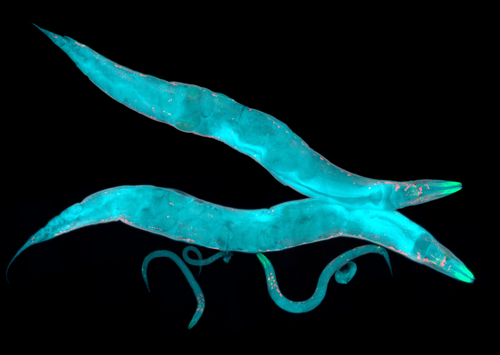Why we did not evolve to live forever: Unveiling the mystery of why we age: Breakthrough in understanding the origin of the ageing process
science·@beesteem·
0.000 HBDWhy we did not evolve to live forever: Unveiling the mystery of why we age: Breakthrough in understanding the origin of the ageing process
*Researchers at the Institute of Molecular Biology (IMB) in Mainz have made a breakthrough in understanding the origin of the ageing process. They have identified that genes belonging to a process called autophagy – one of the cells most critical survival processes – promote health and fitness in young worms but drive the process of ageing later in life.* >The theory of evolution is beautiful, but it also raises some interesting questions. For example, why are we getting older, or why do we die?  **Natural selection** We are evolving thanks to natural selection. This natural selection results in individuals who are best adapted to their environment and thus have the best opportunities to **reproduce** and pass their genes to the **next generation**. The more important a particular feature/genome part for reproductive success is, the stronger that part will be selected. In theory, you would expect it to lead to individuals with features that prevent aging, as these individuals could infinitely improve their genes. *But the opposite is true: virtually every species on this planet has to grow older.* **Darwin** As Charles Darwin explained, natural selection results in the fittest individuals for a given environment surviving to breed and pass on their genes to the next generation. The more fruitful a trait is at promoting reproductive success, the stronger the selection for that trait will be. In theory, this should give rise to individuals with traits which prevent ageing as their genes could be passed on nearly continuously. Thus, despite the obvious facts to the contrary, from the point of evolution ageing should never have happened. This evolutionary contradiction has been debated and theorised on since the 1800s. **Theory** How can that be explained? Researchers have had an interesting theory for a few decades. This suggests that genes that have a positive effect on *reproductive success*, without looking at the adverse effect that these genes will have longevity - in the long term - after the reproductive success is a fact. In other words, if a particular gene mutation results in more progeny but shortens the life of the individual, that is evolutionary - no problem. The shorter life span is then compensated by the fact that the individual can quickly put a lot children - with his genes - on the world in a short period of time. Over time, resulting in better/ more species, but at the same time still leading to aging species. **The experiments** A beautiful theory. But in practice, the researchers did not succeed in finding evidence. Until now. "The evolutionary theory of aging explains everything so beautiful, but it lacked real evidence that this actually happened in nature," researcher Jonathan Byrne explains. "Evolution will be blind to the effects of mutations that promote age, as long as those aging effects only arise *after reproduction* has begun. Age is really a piece of **evolutionary inattention.** "  **Thirty genes** Byrne and colleagues studied worms that belong to the type of *Caenorhabditis elegans*. They identified 30 genes that play a crucial role in a process called **autophagy**. This is a process that is crucial for the survival of cells and promoting the health of young worms. But in later years - after the worms had grown up and replicated - these genes appeared to be the driving force behind the aging of the worms. "In younger worms, autophagy works fine and the process is important to mature, but after reproduction it makes the worms aging," according to researcher Holger Richly. Although the researchers in their study identify 30 genes that lead to better propagation opportunities and aging at a later age, there are probably more. "We only tested 0.05% of all genes in the worm," Byrne emphasizes. **Live longer** In their studies, the researchers also show that they cancombat aging in these roundworms. By eliminating the process of autophagy in the neurons of old worms, the life of those worms was **significantly extended**. Also, the health of the worms was significantly improved. "We switch off autophagy in just one tissue and the whole animal gets a boost," says researcher Thomas Wilhelm. "The neurons of the treated worms are much healthier and we think that their muscles and the rest of the body will remain in shape. Net results in a 50% longer life. " **The Effect on humans?** It is still unclear whether the study has implications for humans, but the researchers point out that various human conditions are associated with interference in the process of autophagy. You should think of Alzheimer, Parkinson, but also Huntington. A treatment aimed at the autophagy genes might be able to provide a solution. But first, more research is needed. Sources: Wilhelm et al., Neuronal inhibition of the autophagy nucleation complex extends life span in post-reproductive C. elegans, Genes & Development, 7 September 2017: http://www.uni-mainz.de/presse/aktuell/2595_ENG_HTML.php http://genesdev.cshlp.org/content/31/15/1561
👍 beesteem, alexiapbullard, redes, fredrikaa, minnowsupport, banjo, pharesim, endaksi1, edrivegom, raymondspeaks, konti, jhermanbeans, valth, lastminuteman, businesswri, gindor, whatamidoing, cryptastic, timbalabuch, ohamdache, pusteblume, cryptohustler, tinashe, jean.racines, n1kofi, ch00fy, professorbromide, markfitzgerald, nesbitt, bluchr, shehbaznawaz, eliashanna, abigail-dantes, stephen.king989, steemprentice, pomperipossa, sixexgames, numpypython, decibel, jhagi.bhai, beng05, qwasert, taica, myday, gamerveda, pkvlogs, drotto, steemstem, justtryme90, timsaid, lemouth, jamhuery, mobbs, kenchung, dber, alexander.alexis, ovij, kharrazi, azirgraff, dna-replication, curie, velourex, anwenbaumeister, hendrikdegrote, kushed, olyup, ben.zimmerman, toxichan, randyclemens, solar, cebymaster, ninkhisibir, allgoodthings, cotidiana, ourlifestory, sellergenius, beeskee, timothyb, cheah, marcosespes1, tabea, mxzn, abishai, palmtreetrading, ananiani, misterakpan, garudi, mrlogic, krizia, steemedia, john-gpr, bp423, locikll, dirty.hera, sethlinson, shahzadnisar, alainite, nataliejohnson, blackwidow7, edith4angelseu, mountain.phil28, greentree1, jaki01, prapanth, lafona-miner, foundation, the-devil, himal, kyriacos, lamouthe, sunisa, mawardi, himshweta,